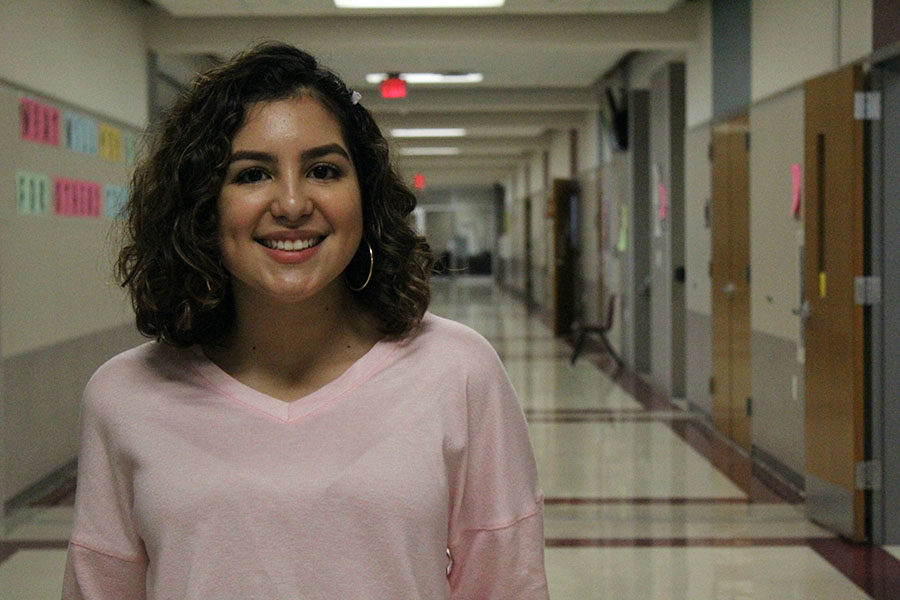Remembering her past
She was terrified but excited as well, with mixed emotions toward leaving her native country. At six years old she didn’t realize that she was leaving her extended family forever. Due to her fear of heights, the seven-hour plane ride was not comforting on her way to a new world.
Junior Micaela Galvez is originally from Lima, the capital of Peru. She moved from Lima to Coppell, Texas at the age of 6. At the time, Galvez didn’t understand why she was moving to America, but she soon realized Peru wasn’t a country with chances to support her and her family.
“The economy in Peru is very bad,” Galvez said. “There’s not many job opportunities, the most job opportunities is only if you’re a young man.”
Galvez’s first few years in America were spent living with her mother’s friend. Before she began elementary school, Galvez would watch TV with her mom and aunt, paint pictures and even learn how to read.
“We’d always watch ‘The Pink Panther’, ‘Betty Boop’ or ‘Popeye,’” Galvez said. “[My mother’s friend even] taught me [how] to read roman numerals.”
Galvez was shocked by the level of security presented to her as she entered the United States. The number of cautions taken by Americans was unusual but she cooperated regardless.
“The thing that scared me the most [when moving] was the airport security,” Galvez said. “Once we got into the United States, the migration police took my Hello Kitty plates and cutlery.”
American customs was extremely hard for Galvez to understand, she had to adapt to the social norms of America. Public displays of affection were completely different in Peru, so she had to adapt from her affectionate greetings to her peers that she used in Peru.
“The first few days of school, I got in trouble and was sent to the principal’s office because I’d greet all the kids with a hug and a kiss on the cheek,” Galvez said.
Moving to America created many struggles for Galvez; the language barrier was the primary issue for her. It was difficult for Galvez to make friends with others because her peers only spoke English. She was only able to speak to one teacher because that teacher was the only other person who could understand Galvez’s native language.
“I remember when I went to pre-K, nobody wanted to talk because I couldn’t speak to them,” Galvez said. “So every day I’d sit under the same table and cry.”
Junior Chris Alamos met Galvez during their seventh-grade year. Alamos supported her when she needed it the most. Alamos knew that she needed someone to lean on and he tried to aid her as much as possible. Although he isn’t from Peru, he helped her adapt nonetheless.
“She wishes there was more people to talk about the culture,” Alamos said. “She wants more people to relate to her.”
Alamos talks with Galvez about Peru’s economy, sports, or politics. Alamos relates to Galvez by knowing the current events Peru has experienced.
“She’s really in touch with her Latin culture, and she really always on top of her sports in Peru as well as her politics,” Alamos said.
Galvez’s orchestra teacher, Kevin Sluder, has praised her ability to grow and socialize with the varsity group in orchestra. She has made friends through orchestra and bonds with her peers over their shared love of music.
“She’s definitely matured a lot musically, especially since she’s made her way up into the varsity group,” Sluder said.
Although Galvez shows her social maturity, Sluder has seen her continue to be herself by showing how she is harmlessly eccentric. She doesn’t show restraint from expressing herself
“She seems to let herself be herself, and if she’s feeling goofy or loud, in the moment she’s goofy and loud,” Sluder said.
Galvez has been through many struggles and has overcome the challenges presented to her. Growing up in America has shown her a new way to perceive the world and she’s glad to be her.
“Since I’ve lived here for ten years, I’ve assimilated to American society pretty well,” Galvez said. “In a way, I am an American teen by classification.”

